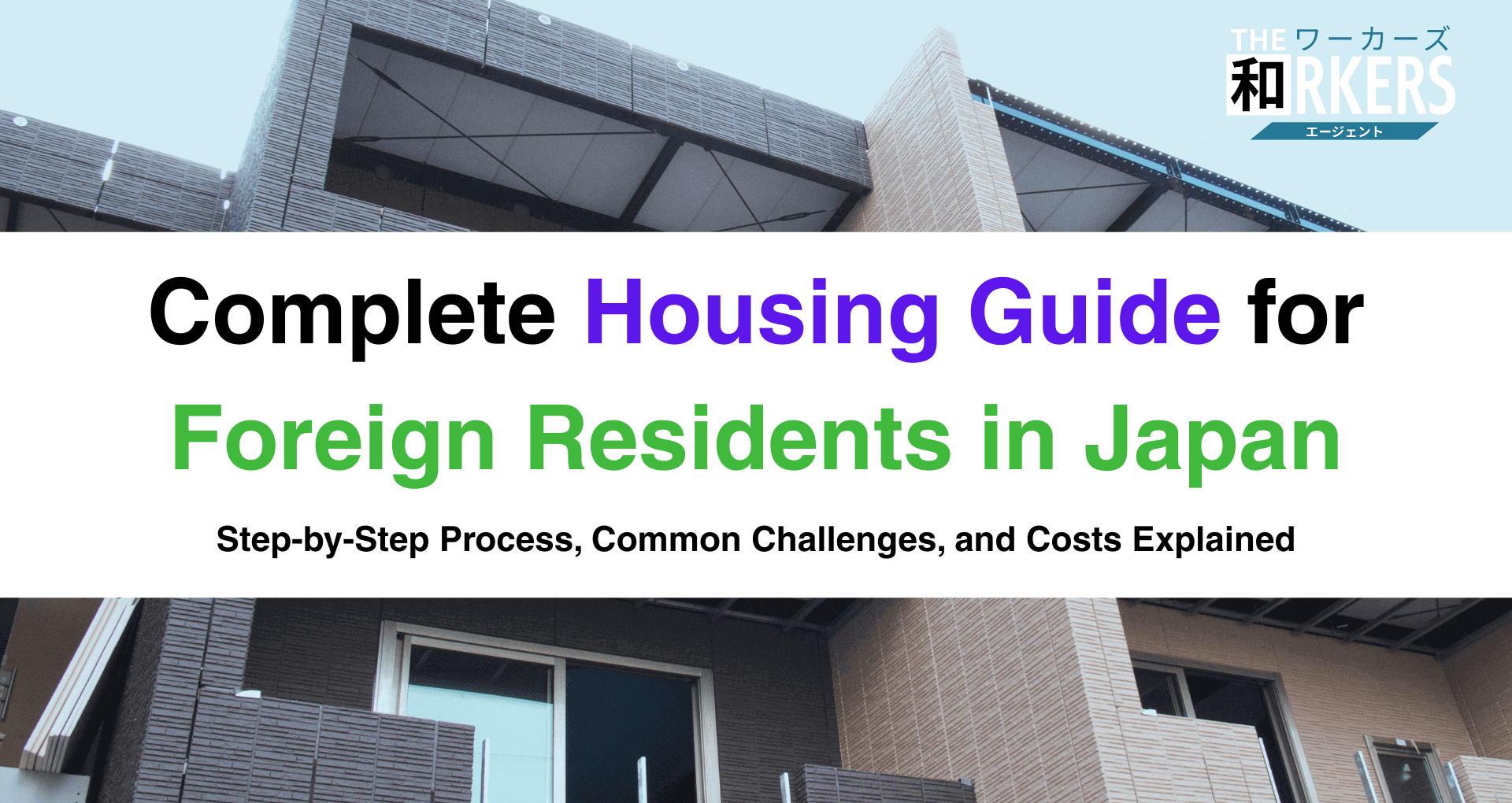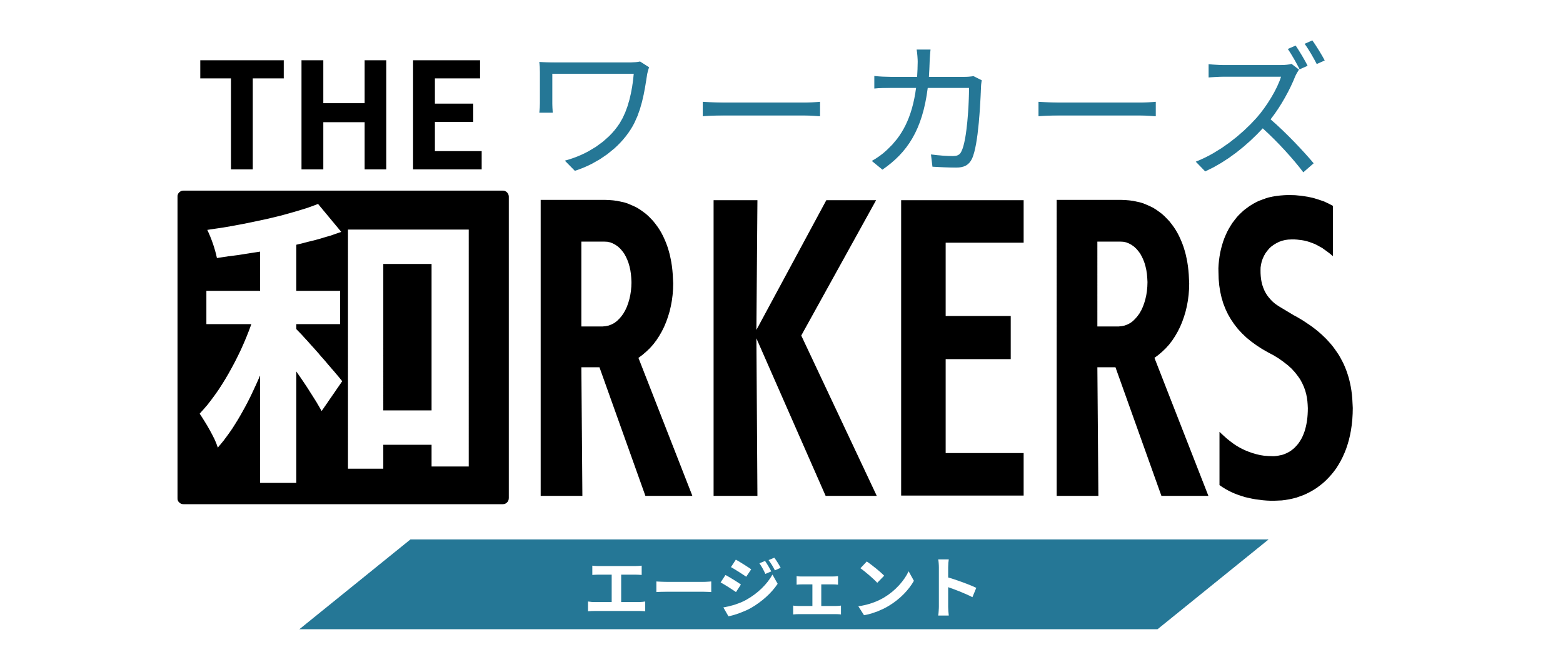Complete Housing Guide for Foreign Residents in Japan

For foreign residents looking for a place to live in Japan, the rental process can feel very different from what they are used to in their home country. High initial costs, the need for a guarantor or emergency contact, and rental agreements written entirely in Japanese are just a few of the hurdles they may face. At the same time, there are plenty of options that make things easier—such as real estate agencies that specialize in helping foreigners, short-term rental contracts, and fully furnished apartments.
This guide covers everything: the steps to finding a home, the most common challenges and how to overcome them, and the types of housing best suited for foreigners. With this knowledge, you can approach your house-hunting in Japan with confidence.
Reference
国土交通省 「外国人の民間賃貸住宅への円滑な入居について」
1. The Complete Process of Finding a Home in Japan
When renting an apartment in Japan, the process usually follows the steps below. For foreign residents, there are some unique points to keep in mind, as well as tips to make the process smoother.
1-1. Decide Your Budget
As a general rule, rent should not exceed one-third of your monthly income, and this ratio is often considered during the tenant screening process. However, one major difference in Japan is the high initial costs. At the time of signing the contract, you may be required to pay the equivalent of 4–6 months’ rent upfront.
Breakdown of Common Initial Costs
| Item | Explanation | Typical Amount |
|---|---|---|
| Shikikin (Security Deposit) | Used to cover unpaid rent or restoration costs when moving out. Any remaining balance is refunded. | 1–2 months’ rent |
| Reikin (Key Money) | A non-refundable gratuity paid to the landlord. | 1–2 months’ rent |
| Agent’s Commission | Fee paid to the real estate agency when the contract is signed. By law, the maximum is one month’s rent + tax. | 1 month’s rent + tax |
| Advance Rent | Rent for the first month, paid upfront at contract signing. | 1 month’s rent |
| Guarantor Company Fee | If you don’t have a guarantor, you may need to use a guarantor company. This is the fee for the first year. | 30–100% of monthly rent |
| Fire & Liability Insurance | Covers risks such as fire, water damage, or accidents. Often bundled with liability coverage. | ¥4,000–20,000 per year |
| Other Costs | May include key replacement, cleaning, and common service fees. | A few thousand yen to several tens of thousands |
Tip:
- If you want to keep initial costs down, search for properties with “no key money” or “furnished” options.
- Keep in mind that if furniture and appliances are not included, you’ll also need to budget for these purchases separately.
1-2. Research & Information Gathering
When searching for housing in Japan, it’s more efficient to use multiple methods in parallel rather than relying on a single source.
① Real Estate Agencies for Foreigners
- Offer multilingual support (English, Chinese, Korean, etc.)
- Have extensive experience helping foreign tenants
- Can recommend properties with a higher chance of passing the screening process
② Online Search Platforms
- GaijinPot (English)
- Real Estate Japan (English)
- Apartment Japan (English)
- mooovin (English)
③ Local & Community Sources
- Bulletin boards at companies or schools
- Social media communities (e.g., Facebook groups for expats in Japan)
- Foreign-friendly share houses and monthly apartments
Tip:
- Separate your requirements into “must-haves” (e.g., rent limit, area, floor plan) and “nice-to-haves.” This will make your search faster and more effective.
- The rental market is most active during peak seasons (February–April, September–October), when more listings become available—but competition is also much tougher.
1-3. Viewing Properties
Photos and floor plans don’t tell the full story—always visit the property in person before making a decision.
Key Points to Check
- Sunlight & Ventilation – Conditions can change between morning and afternoon.
- Neighborhood Environment – Safety at night, nearby facilities, location of garbage collection points.
- Noise Levels – From roads, trains, or neighboring units.
- Condition of Facilities – Plumbing, air conditioning, stove, storage space.
- Signal Strength – Check mobile phone reception and Wi-Fi connectivity.
Tip:
- If allowed, take photos or videos during the visit so you can compare properties later.
- Before signing, make a list of questions and clarify any uncertainties with the agent or landlord.
1-4. Application & Screening
Once you find a property you like, you’ll need to submit an application form along with the required documents and pass the landlord’s screening process.
Commonly Required Documents
- Residence Card (if already living in Japan) or passport
- Proof of income (such as payslips or an employment contract)
- Emergency contact in Japan – Often landlords require a Japanese national; this could be a long-term friend, partner, or your workplace.
- Guarantor information (a resident of Japan with stable income) or a guarantor company contract
What Landlords Look For
- Ability to pay rent (income, employer, contract duration)
- Length of stay in Japan
- Ability to communicate in Japanese
Tip:
- If you don’t have a guarantor, inform the agency early and prepare to use a guarantor company.
- Always confirm in advance whether the property accepts foreign tenants (“no foreigners” policies still exist).
1-5. Signing the Lease
If you pass the screening, you’ll sign and stamp the rental contract.
Important Points at Signing
- Contracts are almost always in Japanese. Ask for translation support or bring someone who can interpret.
- The standard lease term is 2 years. Early termination may involve penalty fees or short-term cancellation charges.
- At renewal, you’ll often need to pay a renewal fee (typically one month’s rent) plus a small administrative fee.
Tip:
- Carefully check the move-out settlement conditions, such as cleaning fees or restoration costs.
- Canceling after signing can result in very high penalties, so be 100% sure before committing.
1-6. Moving In
After signing, you’ll receive the keys and officially move into your new home.
To-Do Checklist Upon Move-In
- Inspect the property for scratches, stains, or damage and take photos as evidence.
- Set up utilities: water, electricity, and gas.
- Arrange for internet installation (book early if construction is required).
- File a mail forwarding request at the post office.
- Update your residence registration at the local city/ward office.
Tip:
- Report any problems to the management company immediately; if you wait, you may be charged for repairs later.
- Local rules for garbage disposal and shared spaces vary by municipality—make sure to confirm them in advance.
2. Common Challenges Foreigners Face When Renting in Japan
Foreign residents often encounter unique challenges in the Japanese rental market compared to local tenants. Below are the most common issues, their background, and practical solutions.
2-1. Language Barrier
Challenge
- Rental contracts, important explanations, and move-in guides are almost always in Japanese.
- Many specialized terms (e.g., genjō kaifuku – restoration costs, shikibiki – non-refundable deposit, kōshinryō – renewal fee) are difficult to understand and translation apps may cause misinterpretations.
Background
- Under the Real Estate Transaction Law, important explanations are required to be given in Japanese. Foreign-language support is not mandatory.
Solutions
- Use real estate agencies that offer services in English, Chinese, Korean, etc.
- Bring an interpreter when signing the lease.
- Request a copy of the contract in advance and have it translated or reviewed by a professional.
2-2. Screening & Application Rejections
Challenge
- Applications may be rejected if the tenant “does not speak Japanese,” has a “short-term stay,” or “unstable employment/income.”
- Even if not explicitly labeled as “No Foreigners,” applications can still be denied.
Background
- Landlords and property managers worry about late rent payments, contract violations, or neighborhood disputes.
- To avoid potential issues from language barriers or misunderstandings, many adopt a conservative screening stance.
Solutions
- Having a long-term visa (work, student, or permanent residency) and stable employment improves approval chances.
- Submitting a recommendation letter from your employer or school provides additional credibility.
- Work with agencies specializing in foreigner-friendly rentals.
2-3. Securing a Guarantor
Challenge
- Many leases require a joint guarantor who lives in Japan and has stable income.
- Foreign residents without relatives or close friends in Japan often struggle to find one.
Background
- Guarantors are legally responsible for unpaid rent or restoration costs, making the role a heavy burden.
Solutions
- Use a guarantor company (typically charging 30–100% of one month’s rent for the first year).
- Consider UR rentals or certain properties that do not require guarantors.
2-4. Emergency Contact Requirement
Challenge
- Rental contracts usually require listing an emergency contact in Japan.
- Landlords often prefer a Japanese relative or friend, which may be difficult for foreigners.
Background
- An emergency contact is not legally responsible but serves as a point of contact in cases of illness, accidents, or communication issues.
- Many landlords, especially older ones, prefer someone they can reliably reach in Japanese.
Solutions
- Ask a trusted friend or coworker in Japan to act as your contact.
- Some agencies or guarantor companies allow combinations such as “overseas family + Japanese-speaking colleague.”
- If you only have overseas contacts, consult an agency specializing in foreign tenants.
2-5. Long-Term Contracts as the Standard
Challenge
- Most leases in Japan are for two years.
- For short stays (a few months to under a year), landlords may refuse the contract or charge high penalty fees.
Background
- Landlords prefer long-term tenants for stable rental income. Short-term stays are often considered high risk.
Solutions
- Use short-term rental options such as monthly apartments, share houses, or guest houses.
- These often come furnished and require no key money or deposit, though monthly rent tends to be higher.
2-6. Unfurnished Apartments
Challenge
- Most rental properties in Japan are unfurnished, meaning you need to purchase essentials like a refrigerator, washing machine, lighting, and sometimes even an air conditioner.
Background
- In Japan, tenants are expected to remove all furniture and appliances when moving out, leaving the unit empty.
Solutions
- Look for furnished apartments or short-term rentals.
- Use furniture rental services to reduce upfront costs.
- Buy second-hand items from recycle shops or flea market apps to save money.
3. Main Costs to Expect When Renting in Japan
In most cases, signing a rental contract in Japan requires upfront costs equivalent to 4–6 months of rent. For many foreigners, this can be an unexpected burden, making advance preparation and understanding essential.
Breakdown of Common Initial Costs
| Item | Explanation | Typical Amount | Key Notes & Saving Tips |
|---|---|---|---|
| Shikikin (Security Deposit) | Refundable deposit used for unpaid rent or restoration costs when moving out. Remaining balance is refunded. | 1–2 months’ rent | – Check the contract for the scope of restoration (normal wear and tear cannot be charged).- Take photos of scratches or stains at move-in for proof. |
| Reikin (Key Money) | A non-refundable payment to the landlord, considered more of a cultural custom. | 1–2 months’ rent | – “No key money” properties are becoming more common.- Choosing one can save you hundreds of thousands of yen. |
| Agent’s Commission | Fee paid to the real estate agency. By law, the maximum is one month’s rent + tax. | 1 month’s rent + tax | – Some properties offer discounts (e.g., half commission).- If multiple agencies show the same property, negotiation may be possible. |
| Advance Rent | Rent for the move-in month, usually paid upfront. | 1 month’s rent | – Starting your lease at the end of the month may reduce advance rent. |
| Guarantor Company Fee | Required if using a guarantor company (almost unavoidable for foreigners). | 0.5–1 month’s rent (first year) | – Annual renewal fees may apply (around ¥10,000 per year).- Compare different guarantor companies if options are available. |
| Fire & Liability Insurance | Covers damage from fire, water leaks, etc. Often bundled with liability coverage. | ¥4,000–20,000 per year | – Online applications can sometimes be cheaper than through agencies.- Confirm coverage (should include both household goods and liability). |
| Other Costs | Key replacement, cleaning, common service/maintenance fees, etc. | A few thousand yen to several tens of thousands | – Key replacement may be optional, but recommended for security.- Common fees cover shared facilities like elevators and hallways. |
Points Foreign Residents Should Pay Extra Attention To
- Guarantor Company Fees Are Almost Unavoidable
Without a Japanese guarantor, most contracts require using a guarantor company. Expect this cost as part of your budget. - Deposit Refund Disputes
Disagreements over restoration costs (shikikin) are common. Always check your contract and review the Ministry of Land, Infrastructure, and Transport’s guidelines beforehand. - Check Whether Common Fees Are Included
Some properties charge several thousand to tens of thousands of yen per month as additional maintenance or common service fees.
Tips for Reducing Costs
- Search with filters such as “no key money,” “no deposit,” or “no guarantor required.”
- Avoid peak seasons (Feb–Apr, Sept–Oct), when competition drives up initial costs.
- Choose a furnished apartment to save on purchasing furniture and appliances.
4. Housing Options Recommended for Foreign Residents in Japan
When searching for a home in Japan, foreign residents have several options that make contracts easier and allow for a smoother start to daily life. Here are four popular housing types, along with their key features, advantages, disadvantages, and who they are best suited for.
4-1. Foreigner-Friendly Real Estate Agencies
Features
- Multilingual staff available (English, Chinese, Korean, etc.)
- Experienced in handling foreigner contracts, offering properties with higher chances of screening approval
- Often provide options such as furnished apartments, short-term contracts, or “no guarantor required” properties
Advantages
- Lease contracts and explanations can be provided in English or your native language
- Support with document preparation and guarantor company arrangements
Disadvantages
- Rent and initial costs may be slightly higher than the market average
- Property listings may be limited compared to mainstream agencies
Best For
- Foreigners who are not confident in Japanese
- First-time renters in Japan
Examples
- Japan Home Search
- Best-Estate.jp
- Asumirai
4-2. Share Houses / Guest Houses
Features
- Tenants share kitchens, living rooms, bathrooms, and toilets, while having their own private rooms
- Rent often includes utilities, and no deposit or key money is required
Advantages
- Very low initial costs (starting from just tens of thousands of yen)
- Fully furnished with appliances, allowing immediate move-in
- Easy to make friends and get practical life advice from other residents
Disadvantages
- Limited privacy
- Many rules for using shared spaces
Best For
- Students and short-term residents
- Those who value community living
Examples
- Oakhouse
- Sakura House
- Borderless House
4-3. UR Rentals (Urban Renaissance Agency)
Features
- Public housing operated by Japan’s Urban Renaissance Agency (UR), under the Ministry of Land, Infrastructure and Transport
- No guarantor required, no key money, and no agent’s commission
Advantages
- Low initial costs
- No renewal fees
- Nationwide availability with a wide variety of layouts and locations
Disadvantages
- Income and residency requirements; not suitable for short-term stays
- Properties are unfurnished
Best For
- Mid- to long-term residents (2 years or more)
- Those with stable income
Official Site
- UR Rental Housing
4-4. Monthly / Weekly Apartments
Features
- Fully furnished with furniture, appliances, and daily necessities
- Contracts available on a weekly or monthly basis
Advantages
- Immediate move-in, no deposit or key money
- Rent often includes utilities
- Simple and straightforward contract process
Disadvantages
- Higher rent per month compared to standard rentals
- Not cost-effective for long-term stays
Best For
- Temporary accommodation right after arriving in Japan
- Business travelers or trainees staying for a few months
Examples
- LeoPalace21
- Monthly Mansion
- Weekly Mansion Tokyo
Tips for Choosing the Right Option
- By length of stay:
- Less than 1 year → Share houses or monthly apartments
- More than 1 year → UR rentals or standard apartments
- If you want to minimize initial costs: Search for “no key money” or “no guarantor required” properties
- If you are not confident in Japanese: Go through a foreigner-friendly real estate agency
5. Conclusion
Renting an apartment in Japan comes with high upfront costs and a unique contract process. However, with the right preparation and by using foreigner-friendly agencies or carefully selected property types, the process can go far more smoothly than you might expect.
Key Success Points
1. Prepare Thoroughly in Advance
- Gather essential documents: residence card, passport, proof of income, and an emergency contact in Japan
- Plan your finances with the understanding that initial costs usually equal 4–6 months of rent
2. Secure Support Systems
- Use real estate agencies that provide services in your language to avoid misunderstandings
- Arrange for a guarantor company and emergency contact early
3. Choose Housing Based on Your Stay Duration
- Short-term (under 1 year): Share houses, monthly apartments, furnished rentals
- Long-term (1 year+): UR rentals or standard unfurnished apartments to minimize costs
4. Negotiate and Compare
- Key money, agent fees, and guarantor fees can often be reduced through negotiation or by choosing the right property
- Compare multiple listings and agencies to find the best deal
Next Steps
- Write down your conditions (budget, area, length of stay, must-have facilities)
- Contact a foreigner-friendly real estate agency or trusted online platform
- Visit several properties to compare costs and conditions
- Fully understand the contract before signing, then move on to preparing for your move-in
Final Message
With proper preparation and research, finding housing in Japan is absolutely achievable. By choosing the right property and support system, you can start your new life in Japan with confidence and peace of mind.
\Software Engineers, IT Consultants, Data Scientists…/

Non-Japanese and aiming for a top-tier job in Japan?
Get in touch with THE 和RKERS Agent today.



Software Engineers,
IT Consultants,
Data Scientists…

Non-Japanese and aiming for a top-tier job in Japan?
Get in touch with THE 和RKERS Agent today.
